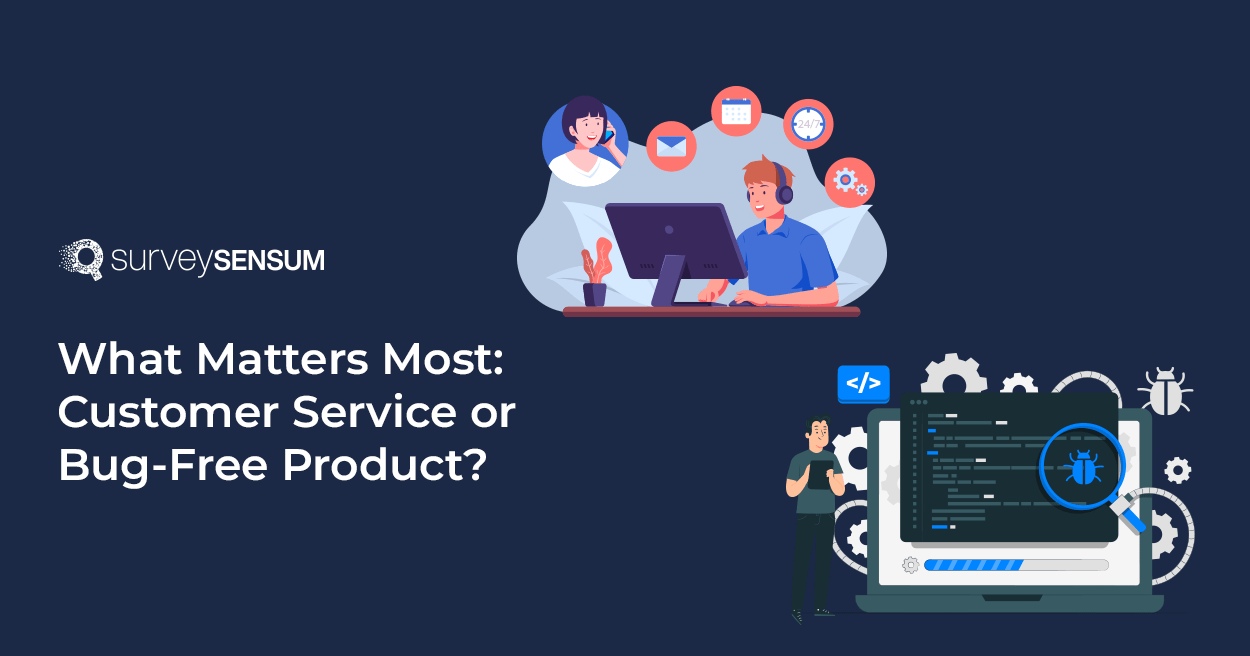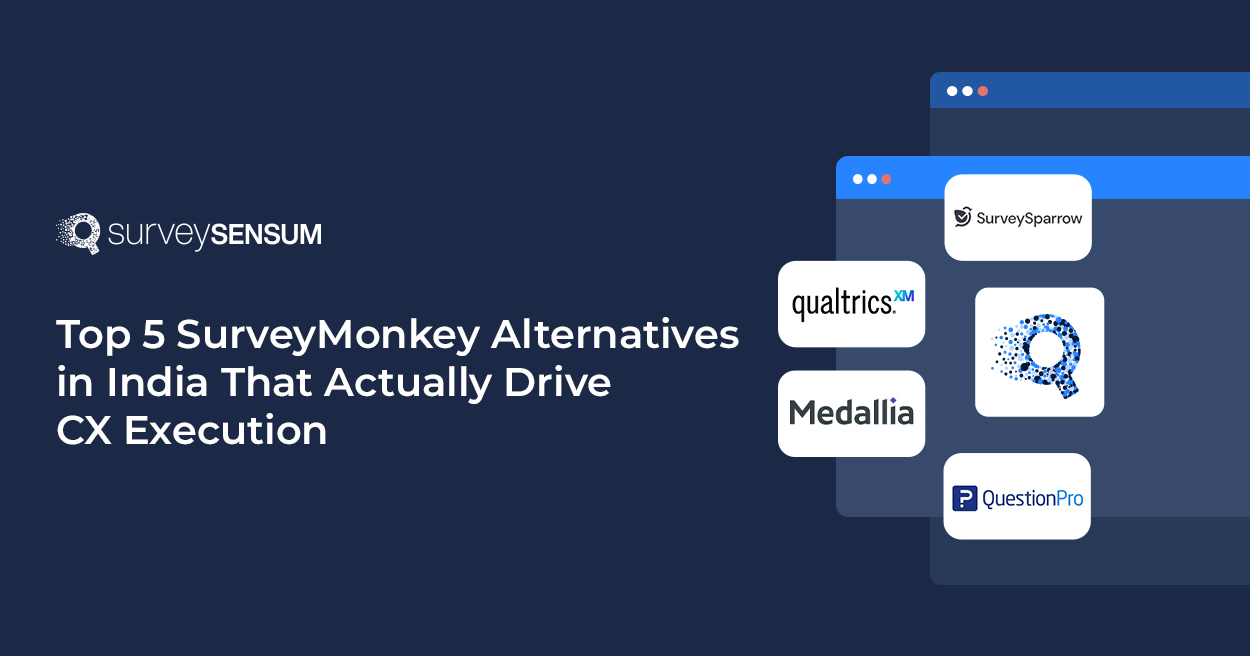

What would you choose?
- A product with exceptional customer service
- Or a bug-free product?
In the ever-evolving landscape of business, the ongoing debate regarding whether customer service or bug-free product should take precedence continues to fuel discussions. So, we dedicated ourselves to taking up this discussion on the internet and asked top CX experts about their opinions on the ‘CX Question of the Day’ initiative.
They provide varied insights that highlight the nuanced relationship between these key elements while emphasizing the significance of incorporating valuable product feedback into the equation through a robust product feedback platform.
So, let’s dive into this discussion to understand the experts’ views and get our answers on which is more important – customer service or bug-free product.
The Unidirectional Power of Product
Matt Beckwith kicks off the conversation by emphasizing the inherent unidirectionality of the product.
Matt Beckwith: Yes! My position is that Product beats Service but only because of its inherent unidirectionality. But really, it’s like Yogi Berra said about baseball…
Average Product, Excellent Customer Service
Tanuj Diwan, Co-Founder at SurveySensum, adds a layer to the narrative, asserting that people are often willing to use average products as long as they come with excellent customer service.
Tanuj Diwan: I agree, that the product should always be better but in reality, people are actually willing to use average products with excellent customer service. This happens all the time when we go to a restaurant, we always go back to places with excellent customer service even if the food is average.
Excellent Product, No Customer Service
Erica Mancuso introduces a counterargument, suggesting that people may still buy products with terrible service, using internet service providers as an example.
Erica Mancuso: The argument can also be made that people also buy products with terrible service (think of internet service providers). If my internet never worked but the service was great, I would still cancel my plan.
And Jeff Toister differentiates between a “bad” and “average” product and highlights the importance of keeping promises to customers.
Jeff Toister: Hard to define an “average” product, but a “bad” product is easy: a bad product doesn’t do what it’s supposed to do. Bottom line: if you want to keep your customers, keep your promises.
And Sue Duris brings the discussion back to value.
Sue Duris: That’s why it really comes down to value – I still stick with some products because they are great/fine (sometimes the opportunity cost of switching is better to stay put, too), but the service could be better.
Both Needs To Work Hand-in-Hand
Shep Hyken argues that both product and service are crucial, and finding the right combination results in synergy.
Shep Hyken: And, even if it is a great product, if the customer is treated poorly, they will search for another solution. It takes both, and when you find it, 1+1 = more than 2!
Customer Service Goes a Long Way
Jason Curtis observes that in social media posts, companies are more likely to be praised for great service than low prices.
Jason Curtis: I’ve seen posts on social that say, “Company X is more $$ but worth it because of great service.” Never seen one that says, “Company X is terrible with service but it is worth it because their prices are so low!” Can’t sell garbage, but service goes a long way. #CXQOTD
Great Customer Service Can Create Opportunities to Upsell
Sean B Hawkins echoes the sentiment, emphasizing that good service can lead to upselling opportunities and foster customer loyalty.
Sean B Hawkins: They are equally important. A good product reduces the chances of customer outreach, but good service can garner loyalty and good experiences. Every customer interaction isn’t related to a bad product. Service can create opportunities to upsell or inform about other products.
No Amount of Great Customer Service Can Make Up For a Crappy Product
Erica Mancuso and Sue Duris bring the discussion back to the importance of having an irreplaceable product. They emphasize the fact that no matter how great your customer service is, it cannot replace a crappy product.
Erica Mancuso: No amount of great service can make up for a crappy product. The product is the reason customers buy, but the service should be great as well!
I will also add that#cx is a team sport. Product and service (and other functions like sales and billing) must work together to deliver the ideal customer experience.
Launch Product Feedback Surveys For Free!
Sue Duris: I totally agree with Erica. If a product is crappy, you could have the best service in the world, it wouldn’t matter. But most importantly, do they get value from the product/brand, is it effortless to engage with the brand, and do they feel good engaging with the brand? That’s what matters. #CX just doesn’t work without team alignment across the organization – and I mean all teams, not just the customer-facing ones.
Product Can Be Replaced, Service Can’t
Tanuj Diwan argues back on the importance of having an awesome support team over creating the perfect product.
Tanuj Diwan: In my experience, it’s been B somehow. If the product has some bugs, but support is awesome. I feel more connected to them as a brand. For product, I am willing to move as others can build something like that, but not everyone today has great support.
The Customer Perspective
Viraj Juthani shares the customer’s viewpoint, stating that there’s no perfect product, and customers will always find reasons to contact support.
Viraj Juthani: From the customer POV, there is no perfect product. There will always be some reason to contact support. Even with Apple, the ease they offer for accessing support through their app. Brilliant. Never had to use it once in so many years. But I know they have me covered.
Pehal Choudhary emphasizes the importance of approachable support teams and timely resolutions.
Pehal Choudhary – Tanuj Diwan No product ever launched is bug-free. Products change as per the market conditions and change with customers’ preferences. What brings great power to building the experience is the approachability of the support team or people of the organization. As a customer, even if I am guided with the right timeline and the follow-up for the resolution, I will surely feel good about the org’s values and still be loyal to that. A customer brought the product as he needed it. His valuable suggestions would someday make the product a better version.
Striking the Balance
Vikram S. introduces the concept that a great product with minimal bugs is likely to build more loyalty as it minimizes the need for frequent customer support interactions.
Vikram S.: There is a lot that goes into customer loyalty in addition to product usability and CS, so I won’t arrive at any conclusions looking at these two in isolation. A buggy product with great customer support will be able to patch a few holes, but the bucket will still leak profusely and cause a high churn. Some will churn w/o contacting CS and others who need to call frequently will be fed up soon. A great product with zero or minimal bugs/issues is likely to build more loyalty as it should minimize the traffic to CS and, thus, the negative impact of low support quality. That being said, both complement each other and are needed to build loyalty.
P.S. I wouldn’t add bugs intentionally to make the customers experience our world-class customer support.
Czarina Tabayoyong underscores the significance of quality products and excellent customer service, noting that both play crucial roles in building customer loyalty.
Czarina Tabayoyong(She/Her): In my experience, customers value the quality of the product and how well it functions, but they also appreciate good customer support. Customers are more likely to be loyal to a brand that has products that work smoothly and offer excellent customer service if there are any issues. Brands need to realize that both factors play an important role in building customer loyalty.
The Service Recovery Paradox
Valerie Choniuk introduces the service recovery paradox, highlighting the phenomenon where customers think more highly of a company that successfully corrects a service problem compared to a scenario with flawless service.
Valerie Choniuk, MPA-HCA, CPXP: Service Recovery Paradox (SRP): a phenomenon when a customer thinks more highly of a company after the company has corrected a problem with their service, compared to how they would regard the company if non-faulty service had been provided. The main reason behind this thinking is that successful recovery of a faulty service increases the assurance and confidence of the customer…similar to your personal experience.
Conclusion
This highly engaging discussion among these CX experts suggests that both elements – customer service and bug-free product, are integral, with each playing a unique role in shaping customer loyalty. While an excellent product forms the foundation, exceptional customer service can act as a catalyst for loyalty and positive customer experiences. Ultimately, the ideal scenario involves the harmonious collaboration of both elements, recognizing that each plays a crucial role in shaping the overall customer journey.














